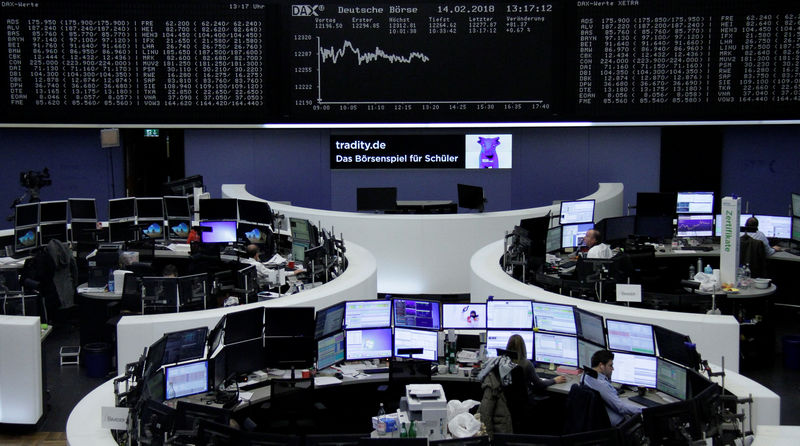By Marc Jones
LONDON (Reuters) - Stocks and commodities steamed higher on Thursday, suddenly shrugging off the angst that has burst out in recent weeks over higher global borrowing costs on the back of rising inflation.
Economists were struggling to explain the shift except for the argument that historically it's not unusual for stocks and bond market borrowing costs to rise in tandem with a rapidly expanding economy.
Some just blamed the weather and time of year. They speculated that Wednesday's strong U.S. inflation data that many had predicted could reignite the rout was probably distorted while Asian bears may be squaring up positions for Chinese new year.
Whatever the reason though, the animal spirits were back for riskier assets like stocks.
Big gains for Wall Street (N) and Asia overnight put MSCI's 47-country world stocks index (MIWD00000PUS) back in positive territory for the year and Europe's main markets followed with 0.6 - 1 percent gains. (EU)
"For me it's a clear indication that inflation is not as big a threat as people made it out to be over the past couple of weeks," said Lukas Daalder, chief investment officer at Robeco in Rotterdam.
"The trend behind the market is still very strongly pointed upwards," he added. "2017 was a very momentum-driven market, and if that's still the case, which after yesterday it appears to be, then we will probably see new highs before too long."
Wall Street futures (ESc1) (N) were also pointing higher but just as big a puzzle as the sudden rebound in stocks sentiment was the break down in correlation between rising U.S. bond yields and dollar.
U.S. Treasury yields on benchmark 10-year notes (US10YT=RR) hit a fresh four-year high of 2.94 percent which also dragged gap to 0.786 percent German Bunds
The dollar tumbled though across the board, including to a 15-month low against the yen of 106.18 yen as worries about the U.S. government's finances seemed to set again after a White House-led spending splurge and recent corporate tax cuts.
That also marked a drop of 3.8 percent from its early February peak near 110.50 yen, while the euro (EUR=) and pound
"The story I hear most frequently from people is it's the re-emergence of the twin deficits," said RBC Capital Markets head of currency strategy Adam Cole, in London, of the dollar's persistent weakness.
"There seem to be concerns on the U.S. fiscal position and what that implies for the current account."
VOLATILITY DROPS
Asia's stocks rally overnight saw Australian shares (AXJO) climb 1.15 percent and South Korea's KOSPI (KS11) added 1.1 percent. Japan's Nikkei (N225) shrugged off the normal drag of a stronger yen to advance 1.5 percent following three successive down day that had taken it to a four-month low. (T)
Volatility shriveled back too. The VIX index (VIX) - Wall Street's "fear gauge" and a measure of market volatility - fell all the way back to 18, less than half the 50-point peak touched last week.
The dollar's weakness also lifted emerging markets and commodities though there were a number of idiosyncratic stories in play too.
After weeks of frenzied speculation, the resignation of South Africa's President Jacob Zuma sent the rand
In reaction to Zuma's resignation, Moody's, which is about to make a decision on whether to remove the country last investment grade credit rating, said it was focused on the new leadership's response to low growth and implementing reforms.
Brent crude futures (LCOc1) shot up over 1 percent meanwhile to $65.06 per barrel before losing momentum and trudging back to $63.87. [O/R]
While the greenback's woes were a big factor, the moves came after a surge the previous day triggered by supply data and comments from Saudi Arabia that major oil producers would prefer tighter markets than end supply cuts too early. [O/R]
Metals copper and gold

Gold